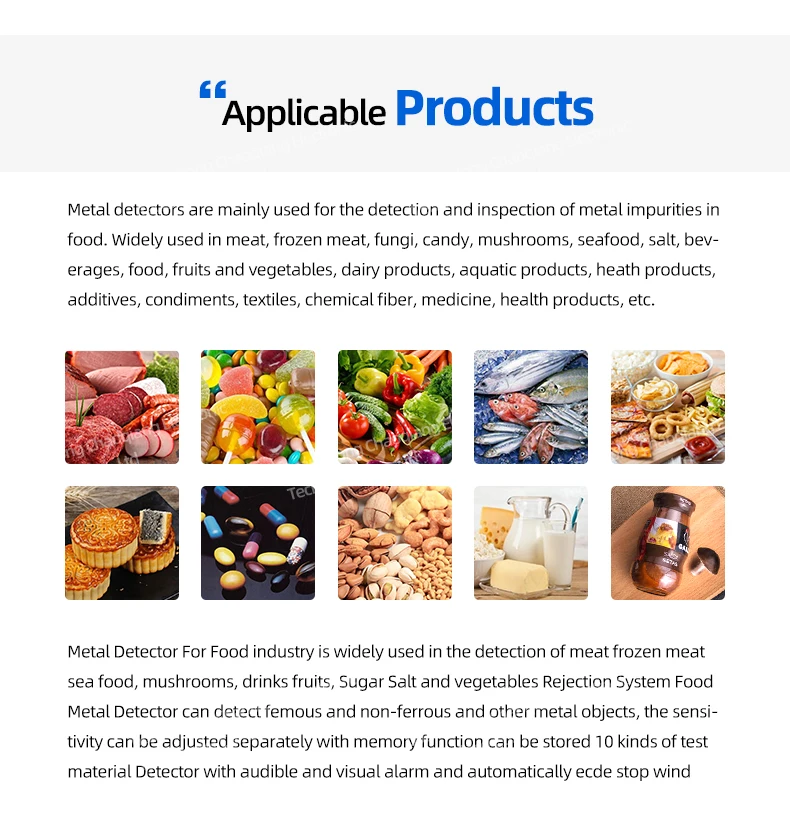| Availability: | |
|---|---|
| Quantity: | |
Leimeng
Here is a brief description of the advantages of a food metal detector:
A food metal detector specifically designed for baked goods offers several advantages in ensuring the safety and quality of these products. These advantages include:
1. Contaminant Detection: A food metal detector for baked goods can accurately detect and remove metal contaminants, such as metal fragments or foreign objects, that may accidentally find their way into the baking process. This helps prevent potential hazards to consumer health and ensures the integrity of the final baked products.
2. Product Quality: By effectively identifying and eliminating metal contaminants, a food metal detector helps maintain the quality of baked goods. Metal fragments can cause damage to machinery, affect the texture of the product, or even pose a choking hazard. Detecting and removing these contaminants helps ensure that the final baked products meet the required quality standards.
3. Regulatory Compliance: Baked goods manufacturers need to comply with food safety regulations to ensure consumer safety. Utilizing a food metal detector helps meet these regulations and prevents potential recalls or penalties due to contaminated products. It demonstrates a commitment to food safety and regulatory compliance.
4. Brand Protection: Implementing a food metal detector for baked goods protects the brand reputation of manufacturers. By ensuring that their products are free from metal contaminants, manufacturers can build trust and loyalty among consumers. Consistently delivering safe and high-quality baked goods helps protect the brand image and promotes customer satisfaction.
5. Process Efficiency: Food metal detectors for baked goods are designed to be efficient, providing fast and accurate detection of metal contaminants during the production process. This helps streamline production, reduce waste, and improve overall operational efficiency. Manufacturers can identify and resolve issues promptly, minimizing production downtime and optimizing resources.
6. Versatility: Food metal detectors for baked goods can be integrated into various stages of the production line, from raw material inspection to finished product packaging. They can detect metal contaminants in dough, fillings, toppings, and even in packaging materials. This versatility allows for comprehensive quality control throughout the baking process.
In summary, a food metal detector specifically designed for baked goods offers significant advantages in ensuring product safety, maintaining quality, complying with regulations, protecting the brand, improving efficiency, and providing versatile detection capabilities throughout the production process.

Here is a brief description of the advantages of a food metal detector:
A food metal detector specifically designed for baked goods offers several advantages in ensuring the safety and quality of these products. These advantages include:
1. Contaminant Detection: A food metal detector for baked goods can accurately detect and remove metal contaminants, such as metal fragments or foreign objects, that may accidentally find their way into the baking process. This helps prevent potential hazards to consumer health and ensures the integrity of the final baked products.
2. Product Quality: By effectively identifying and eliminating metal contaminants, a food metal detector helps maintain the quality of baked goods. Metal fragments can cause damage to machinery, affect the texture of the product, or even pose a choking hazard. Detecting and removing these contaminants helps ensure that the final baked products meet the required quality standards.
3. Regulatory Compliance: Baked goods manufacturers need to comply with food safety regulations to ensure consumer safety. Utilizing a food metal detector helps meet these regulations and prevents potential recalls or penalties due to contaminated products. It demonstrates a commitment to food safety and regulatory compliance.
4. Brand Protection: Implementing a food metal detector for baked goods protects the brand reputation of manufacturers. By ensuring that their products are free from metal contaminants, manufacturers can build trust and loyalty among consumers. Consistently delivering safe and high-quality baked goods helps protect the brand image and promotes customer satisfaction.
5. Process Efficiency: Food metal detectors for baked goods are designed to be efficient, providing fast and accurate detection of metal contaminants during the production process. This helps streamline production, reduce waste, and improve overall operational efficiency. Manufacturers can identify and resolve issues promptly, minimizing production downtime and optimizing resources.
6. Versatility: Food metal detectors for baked goods can be integrated into various stages of the production line, from raw material inspection to finished product packaging. They can detect metal contaminants in dough, fillings, toppings, and even in packaging materials. This versatility allows for comprehensive quality control throughout the baking process.
In summary, a food metal detector specifically designed for baked goods offers significant advantages in ensuring product safety, maintaining quality, complying with regulations, protecting the brand, improving efficiency, and providing versatile detection capabilities throughout the production process.

content is empty!
